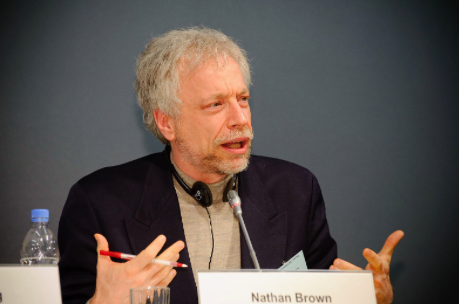
Students, faculty members and New Paltz residents crowded into the Lecture Center Room 108 on Feb. 15 to hear renowned scholar and author Nathan J. Brown speak about hopes for peace between Israel and Palestine, as the Israeli military invasion of the Gaza Strip approaches its fourth month.
The lecture, titled “Israel and Palestine: Are There Still Prospects for Peace?” had listeners hoping that Dr. Brown, who holds a doctorate in politics and Near Eastern Studies, would outline the ways in which a solution could be reached between the two sides, but his answer to the question begged in the lecture’s title was the opposite of optimistic.
“I look at my grandchildren, who are now one and three, and think, ‘Maybe you’ll see such an agreement, but it’s not going to come much sooner than your adulthood,’” Brown, who is 65-years-old, said.
Brown began with the rise of Zionism in the late 19th and early 20th centuries and how Zionists “located the proper place for a Jewish revival and Jewish state in Palestine.” Brown explained how problems arose while Britain, under the Mandate for Palestine, tried preparing the land to become a Jewish state.
“In order for the British to prepare this territory for self-government, that requires Palestine-wide institutions and educational systems, and some mechanism for representing the Palestinian population in government … but to do so with Palestine’s current predominantly Arab majority, was something that the Zionist movement said ‘Wait a second, you’re supposed to be fostering the establishment of a Jewish national home, that means you have to allow more Jews to come into this country, and it means anything that is majority rule is speaking for the current majority and not the future population of this territory.’”
After World War II, both Zionists and Palestinians viewed the mandate with disdain, so Britain announced they would leave and let the newly-created United Nations (UN) handle the issue. The UN created a committee which decided Palestine would be partitioned, which outraged Palestinians.
Shortly after Britain exited Israel, the Zionist leadership declared the State of Israel, which led to a war between the new nation and surrounding Arab states. Following the war, Israel maintained control of the partitioned land, while the Gaza Strip was to be administered by Egypt and Jordan annexed the West Bank.
“What the 1948 war ended with was an Israel that was recognized as an international state, but it had poor relations with its neighbors. If you were to hear how the issue was described at the time, it would be referred to as the Arab-Israeli conflict rather than a Palestinian-Israeli conflict. The idea that Palestinians are a national community, that they have their own leadership, this was one that disappeared on the global level,” Brown explained.
It wasn’t until 1967 that international attention to the conflict was renewed when Israel gained control of the Gaza Strip, West Bank and additional land in Egypt and Syria. This was also when peace talks began, as Brown argued that “now there was a basis on which Israel and Palestine could negotiate on,” although the talks ultimately didn’t lead anywhere.
Brown stated that the late 80s and the early 90s were when prospects for peace between Israel and Palestine seemed the highest, with Palestinian leadership becoming open to the idea of a two-state solution, and Israel looking to speak to the Palestine Liberation Organization (PLO).
“In 1993, you have the first of the Oslo Accords, which seems to be the basis for some kind of negotiated outcome,” said Brown. “It said two things: number one, Israel recognizes the PLO as negotiating for Palestinian people, and the PLO recognizes the existence of the State of Israel. Number two, while we figure everything out, Palestinians in the West Bank and Gaza will begin to run their own affairs.”
According to Brown, there were several critiques on both sides of the first Oslo Accords. Some Palestinians outright rejected the two-state solution, while others were concerned that with the PLO’s recognition of the State of Israel, Israel wouldn’t give anything more.
Critical Israelis, on the other hand, believed that the PLO’s recognition of Israel was a ruse and that handing over any land to Palestine was a “betrayal to Zionism” because of the religious significance of the land.
“It was enormously controversial on both sides. Powerful actors on both sides found ways, in the period after the first Oslo Accords, to maximize mistrust on the other side, and these ‘Final Status’ talks about the possibility of a Palestinian state, the borders, the refugees, etcetera, never got off the ground” said Brown.
Brown shifted to the current situation, calling it a “one-state reality,” due to Israel’s control over the borders, entries and exits, market and airspace while stressing it’s not a solution.
“It is one that leaves the conflict festering, that leads to periodic bouts of violence, and it’s completely unacceptable for Palestinians,” said Brown.
He concluded with Hamas’ Oct. 7 attack, saying it “took a polarized situation and made it more polarized.”
“The idea of any kind of negotiations of Palestinian national movement that includes Hamas is off the table now in terms of where Israel is politically,” Brown said, emphasizing that extremism in leadership on both sides is a large part of the reason why peace between the two is not in the foreseeable future.
The remaining portion of the discussion was dedicated to questions, with listeners scrambling for some sort of reassurance that peace could be achieved soon. One person asked, “Are there non-extremist leaders? If so, where are they in these discussions?”
“On the Palestinian side, the biggest problem is the decay in any leadership,” Brown responded. “There are officials, but there’s no leaders.”
“On the Israeli side, it’s very fragmented. There are those that indicate the idea that we’ve got to find some alternative, but it’s not attached to any viable strategy … they’re often deeply disconnected from Palestinian political realities.”
